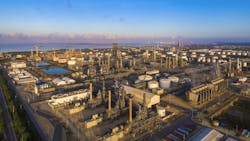Ecopetrol adding green hydrogen plant at Cartagena refinery
State-owned Ecopetrol SA is building a new plant for production of green hydrogen at subsidiary Refinería de Cartagena SAS’s (Reficar) 210,000-b/d refinery in the Mamonal Industrial Zone on Cartagena Bay, south of Cartagena, on Colombia’s northern coast.
Requiring an overall investment of about $28.5 million, the proposed plant will be equipped to produce 800 tonnes/year (tpy) of low-carbon green hydrogen using proton exchange membrane (PEM) electrolyzer technology, Ecopetrol said in a statement and accompanying video posted to the company’s official social media accounts.
The operator revealed neither a timeframe for the project nor a specific licensor of the PEM electrolyzer technology.
Ecopetrol’s Dec. 2 announcement of the planned green hydrogen project at Cartagena follows the operator’s recent completion of pilot testing for production of sustainable aviation fuel (SAF) at the refinery, as well as a series of other initiatives the company has undertaken in line with its commitment to achieve carbon neutrality of operations related to Scopes 1 and 2 emissions of greenhouse gases by 2050 (OGJ Online, Nov. 8, 2024; July 25, 2024).
In April, Ecopetrol completed construction at Cartagena of Latin America’s first-ever solar farm to be built inside a refinery. Located across a 19.9-hectare plot of land and consisting of 40,146 panels, Cartagena’s solar farm is equipped with a capacity of 22.1 Mw for delivery of up to 34.4 million kw-hr/year of electricity.
Scheduled to reach full design capacity by yearend, Reficar said the solar farm aims to reduce carbon dioxide emissions from the refinery by 21,000 tpy once fully operational.
Other works to improve environmental performance of the Cartagena refinery include:
- Installation of pilot plants in 2023 to explore carbon capture and utilization.
- Startup in 2023 of a water neutrality project to explore the potential for completely reusing the site’s wastewater, using alternative sources such as seawater desalination, and improving technologies in the refinery’s cooling systems.
- Installation in 2022 of a pilot plant containing a 50-kw PEM electrolyzer and 270 solar panels for production of green hydrogen.
- Testing in 2023 for production of renewable diesel via co-processing in the refinery’s diesel hydrotreating unit.
- Planned industrial testing in 2024 for processing post-consumer plastic in the refinery’s delayed coker.
- Approval in 2023 of a project to explore potential production of petrochemicals and aromatics from naphtha and hydrogen.
About the Author
Robert Brelsford
Downstream Editor
Robert Brelsford joined Oil & Gas Journal in October 2013 as downstream technology editor after 8 years as a crude oil price and news reporter on spot crude transactions at the US Gulf Coast, West Coast, Canadian, and Latin American markets. He holds a BA (2000) in English from Rice University and an MS (2003) in education and social policy from Northwestern University.

